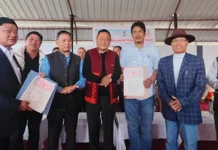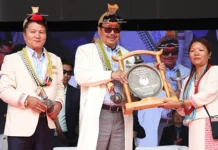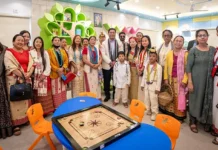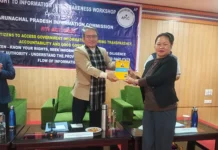PASIGHAT, 18 Nov: The Hindi department of Arunachal Pradesh University (APU) here in East Siang district organised its first academic programme with a special lecture on ‘Adi Loksahitya Mein A:bang Lokgatha: Ek Sanskritik Antah: Vimarsh’ on Tuesday.
APU Vice-Chancellor Prof Tomo Riba highlighted the rich artistic and craft traditions of the Abotani communities of Arunachal. He noted that while the Tani groups possess diverse indigenous art forms, the Adi community in particular sustains the refined oral tradition of A:bang.
Through A:bang, he emphasised, layers of ancestral knowledge, cultural memory, and longstanding traditions are expressed with clarity and depth.
He urged the students to undertake serious research on the A:bang tradition, underscoring its significance within the broader field of indigenous knowledge systems.
During the technical session, resource person Kaling Borang elaborated the socio-cultural significance of A:bang ballads, their narrative structures, and their role in preserving the Adi identity.
Defining A:bang as the sacred oral tradition of the Adi community, he explained how its intricately woven narratives, tales, and ancestral wisdom form a rich storehouse of cultural knowledge.
He also demonstrated the traditional style of A:bang singing by presenting the opening style of Ponung, offering students an authentic experience of the oral form.
Registrar Narmi Darang said that the study of Adi folk literature should not remain confined to the Adi community alone. He encouraged scholars and learners from all backgrounds to explore Arunachal’s diverse folk traditions, so that the region’s cultural heritage receives rightful recognition at the global level.
Hindi HoD Dr Ing Perme said that the initiative sought to familiarise PG Hindi first-semester students with the cultural depth of ‘A:bang Lokgatha’ and to strengthen their understanding of Adi folk literature within the framework of the Indian knowledge system.
She said that the programme aligned with the NEP’s emphasis on integrating indigenous wisdom and oral traditions into mainstream academic study.
The programme was attended by Controller of Examinations Dr Monshi Tayeng, Dean of Academics Prof Prakash Chandra Jena, heads of various departments, faculty members, and students of the university.
Seminar on ‘Bhaktikal ki prasangikta’
Meanwhile, the Hindi department of Jawaharlal Nehru College (JNC) here organised a national seminar on the theme, ‘Bhaktikal ki prasangikta’ on 17 November.
The seminar was organised to foster academic dialogue on the contemporary relevance of ‘Bhaktikal’.
Research scholars, academicians, and students from various institutions across the region, including representatives from Rajiv Gandhi University (RGU) and the Central Hindi Institute participated in the event.
Participating in the seminar virtually, Haridev Joshi University of Journalism and Mass Communication Vice-Chancellor Prof Nand Kishor Pandey traced the origins of the Bhakti movement to ancient Indian and Vedic traditions, describing Bhakti literature as a transformative force that shaped India’s social, religious, and political life.
JNC Principal Dr Tasi Taloh reflected on the academic contributions and legacy of JNC.
Vice Principal Dr Leki Sitang highlighted the Bhakti movement’s influence in Northeast India, particularly among the Adi community.
Earlier, JNC Hindi HoD Dr Harinivas Pandey highlighted the objectives of the seminar.
The first technical session, led by resource person Dr Prasiddha Narayan Choubey, focused on Vedic Bhakti and its impact on medieval intellectual traditions.
Prof Oken Lego described Bhakti as “the light of human civilisation.”
Research scholars presented papers during the technical session.
The second session, chaired by Dr Arun Kumar Pandey, featured Dr Rajiv Ranjan Prasad discussing Bhakti during the Mughal era, along with insights from Dr Chandra Shekhar Choube on Bhakti literature and Prof Pandey’s contributions.
Papers were presented by scholars both offline and online. (With DIPRO input)




